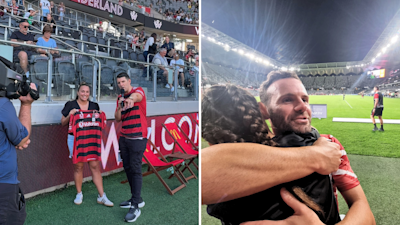Children in care are suspended from school at a rate four times higher than other students.

School bells, the smell of the tuckshop, new pencils, and best friends. When we think back to our education, for some of us it is a source of joy, while for others it can evoke anxiety. Imagine feeling lost in the classroom, sent to the principal’s office, removed from the school community, and shown repeatedly that you don’t belong.
Clea North and Michelle Murray from our Education team share a story about Jason*, a young person in care, where advocacy prevented his exclusion from school.
Jason was given a long term (20 day) suspension. After an extended time away from school due to COVID-19 and previous suspensions, the reality of being denied access to his education again was very overwhelming for this young man, and it had an immediate impact on his mental health and wellbeing.
Learn more about literacy and out-of-home care
While this is not reading like a good news story just yet, it is a very real circumstance for too many of our children.
There was an injustice to this suspension. Jason’s vulnerability in peer relationships, his less developed skills in thinking through consequences, and his willingness to own and repair the poor decision he made were not taken into consideration when the decision to suspend was made.
But Jason is lucky, luck to have a strong team – his carer, a Life Without Barriers Education Consultant, the Life Without Barriers care team and the Department of Children, Youth Justice and Multicultural Affairs - advocating for him. This team collaborated, advocated, and appealed the decision. The appeal was successful, and Jason was able to return to school after five days.
The appeal was successful because this advocacy was informed, and it was linked to policies that require the Education Department to review their decision.
It was also timely, action was taken within three days, and it was cooperative - all parties supported each other to achieve a common goal.
Hopefully, this is reading more like a good story now. A story that empowers others to use strong advocacy that is informed, timely and collaborative to get the right supports for our young people and overturn injustices.

Image: Clea North, Education Consultant
Education engagement is one of the most protective factors for children in out of home care.
Collaboration across education and child protection systems is needed to ensure children in care attend school.
Life Without Barriers is a proud partner of The Australian Research Council Linkage Working Group: Enhancing Children's Journey in Out-of-Home Care: A Multi-perspective Study. This study is working to improve the experiences of, and outcomes for, Aboriginal and Torres Strait Islander children and non-Aboriginal and Torres Strait Islander children in Out-of-Home Care (OOHC).
You can learn more about their findings here: Attending school every day counts – but kids in out-of-home care are missing out (theconversation.com)
*Names have been changed to protect the children in this story.


